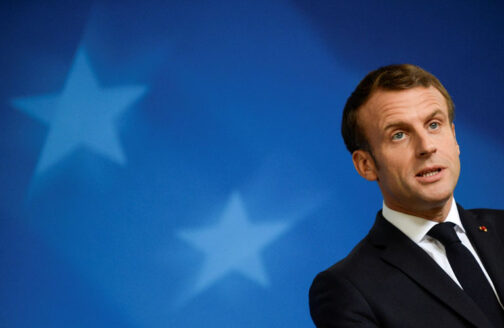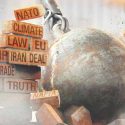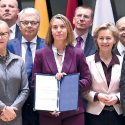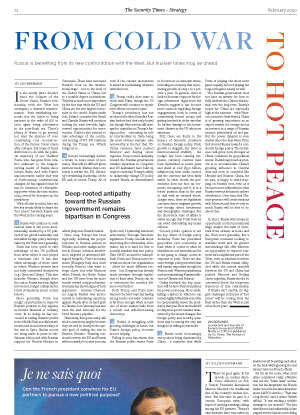Macron: A man on a mission

There he goes again. In his speech on nuclear deterrence delivered on Feb. 7, French President Emmanuel Macron followed the traditional line of his country’s nuclear doctrine. But this time he gave it a certain European twist, with hopes of opening a strategic dialog among his EU partners: “France’s vital interests have now taken on a European dimension,” he said. “Our nuclear forces reinforce, by their very existence, the security of Europe and therefore have a genuinely European dimension.”
Macron is a man on a mission; he’s out to convince his fellow European leaders that the EU can, and must, defend its own interests. This mission has proven costly more than once in the past. Last November, less than four weeks before the London summit due to mark NATO’s 70th anniversary, the French president’s calculated assertion, in an interview with The Economist, that “we are experiencing the brain death of NATO” set off diplomatic shockwaves. And that was exactly the intended consequence: “The last thing we wanted was another summit where leaders would be patting each other on the back while ignoring the real issues,” said one French official.
Yet for all the noise, what most allies considered really offensive was not the “brain dead” accusation but the skepticism the French leader voiced in the same interview about NATO’s Article 5. “That was a big shock,” said a senior British official. “It was sending a terrible message to our enemies.” The fact that Macron had unilaterally, in late August, tried to launch a new dialog on European security with Vladimir Putin did not help.
Having launched his hand grenade, Macron then used the NATO summit and Secretary-General Jens Stoltenberg’s visit in Paris a few days earlier to repeatedly reassure his allies on France’s commitment to NATO and its confidence in Article 5. Russia, he conceded, was definitely “a threat” to its neighbors. French officials pointed out their president’s frustration over Syria to explain his outburst: the withdrawal of US forces, abruptly announced in October by US President Donald Trump, had opened the doors to a Turkish offensive in northern Syria. These decisions by two major NATO allies were taken without consultation with other members of the Alliance who, like France, were involved in the fight against Islamic State (IS) in the area and were exposed to the fallout of Trump’s decision.
This episode was typical of Macron: take advantage of a major disruption to add another layer of disruption in order to “shift the parameters,” as one of his advisers puts it. In this case, most NATO allies admitted that, despite its strength and activity as a military organization, the Alliance itself, as a political umbrella, was in trouble. “Macron has opened a strategic conversation at a political level, and this is important,” a NATO official acknowledged. But there was collateral damage. Questioning NATO’s relevance increased suspicions surrounding his push for European defense among France’s partners. Yet the French are now convinced that they are making inroads. As long as they avoid the words “strategic autonomy,” they feel that the concept itself is gaining traction as their European partners finally take stock of Trump’s contempt for global rules and of his chances for re-election.
What does Macron want – apart from disruption? His long speeches, press conferences and interviews all point to a clear vision of a world where great-power competition has returned, presenting Europe with a drastic choice: prey or power. The changing trans-Atlantic relationship was identified early on as a long-term, fundamental challenge: “For the first time,” Macron says, ”we have an American president who does not share the idea of the European project.” And now the European project itself is at a crossroads. Having lost its main external enemy with the collapse of communism, the EU has lost its sense of history; it needs a new political purpose. The rise of China is another factor of fragility for Europe, with a risk of bipolarization – a US-China “G2” that, in Macron’s view, would deprive the EU of the ability to pursue its own course. The only way for Europe to survive, therefore, is to think of itself as a global power.
All the tools of soft, smart and hard power should be used. As the US multiplies its threats of tariffs, trade becomes a major instrument of foreign policy. Trying to save the Joint Comprehensive Plan of Action nuclear deal with Iran was seen as a European effort. Building up European defense is an obvious priority – and in Macron’s thinking, European defense includes a post-Brexit United Kingdom. European defense also includes industry. Paris never misses an opportunity to point out that US pressure for increased defense budgets in Europe goes hand-in-hand with pressure to buy American equipment. “NATO solidarity is Article 5, not Article F-35,” French Minister of Defense Florence Parly snapped last year in Washington. Within the EU, Macron has pushed for the creation of a new Directorate-General for Defence Industry and Space, which, under the control of European Commissioner for Internal Market and Services Thierry Breton, will manage the European Defence Fund.
Early on, though, the French president’s crusade for a stronger Europe was met with inevitable suspicion. Call it “Gallic prejudice” or the “Gaullist edge” – what he wants, it is feared, is a French Europe serving France’s interests.
Macron’s style and method feed this suspicion. His unabashed tendency to act unilaterally in order to strengthen a multilateral organization irritates his European partners – not least the closest of them, Germany. “This is what leadership means,” says one source at the Elysée. “Either you are a leader or you are not. He is.” But others argue, notably in Brussels, that leadership also means building up support behind you. His Russian initiative is a case in point. By deliberately omitting Berlin – where it would have encountered little opposition – he fed accusations of selling out to Russia from angry Northern and Central European member states. Ambassador Pierre Vimont, a smooth operator well liked in European circles, was belatedly dispatched to mend fences and brief wary partners on the Elysée’s Putin strategy. Sending him before the announcement of Macron’s plan might have helped. The same goes for the controversy over the EU’s enlargement process. France produced merely a non-paper in Brussels, with proposals to reform the EU enlargement process, after refusing to open accession talks with North Macedonia and Albania.
The paradox is that with Russia, Macron is probably genuinely convinced that he was acting in Europe’s interests. Facing the end of the nuclear arms control agreements, he sees a security vacuum on the horizon and wants European interests to be taken into account, including those of the countries closest to Russia that are not covered by the INF treaty and its range of 500 to 5,500 kilometers. His proposal of a new “architecture of trust and security” remains elusive. Forget about “architecture”; the key words are “trust” and “security.” Macron’s hope – that there is room for discussion between reluctant European partners and Moscow’s divisive efforts – seems to be hitting a wall, as Putin shows no signs of movement despite a few positive steps in the Minsk process on Ukraine. The Russian president’s attention will now likely be focused on the transition process in the Kremlin.
One parameter has been constant in Macron’s foreign and security policy: the priority given to the fight against terrorism. Hit by mass terrorism in 2015 and still under active threat, the French generally support maintaining 5,100 French troops in the Sahel, as they have for seven years now, to combat jihad, even at the expense of casualties and even with an increasing feeling that, like Afghanistan, it is a war that may never be won. This is also a crucial element in the complex relationship Paris has with Washington. European support for this combat force will not compensate for the assistance provided by US intelligence and logistics. The French and US militaries have learned to work well together, but every threat of withdrawal tweeted by Trump resonates deeply in Paris – probably more than do his threats of tariffs on French wine.
SYLVIE KAUFFMANN
is editorial director and a columnist for the French daily Le Monde.




